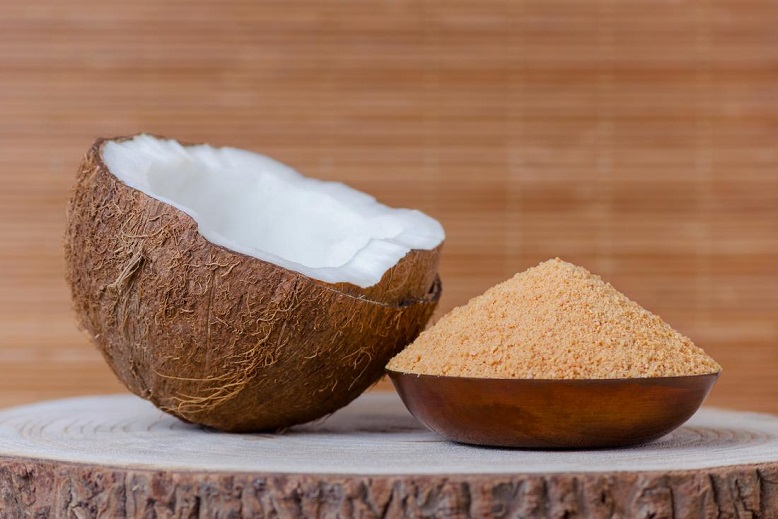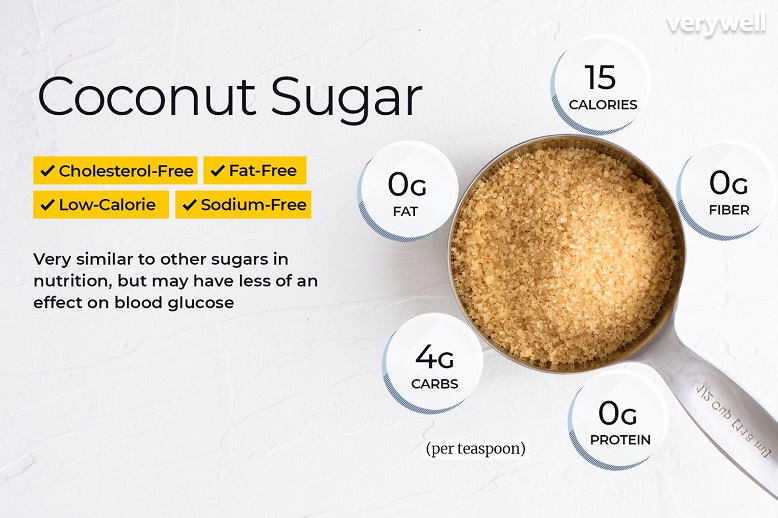If you want to make a positive change when it comes to nutrition, you should start by lowering the amount of sugar you consume on a daily basis. You don’t have to give up on sugar completely. You can substitute it instead. A very popular alternative is coconut sugar which compared to table sugar is more nutritious.
What is Coconut Sugar?
 |
| Source: medicalnewstoday.com |
Coconut trees are part of the palm tree family and grow in the subtropical regions of Asia and Oceania. Coconuts are used for the creation of coconut milk which is a famous substitute for regular milk. Coconut milk is rich in nutrients and is something that vegan people commonly use. Coconut oil is yet another highly valued product. It can be used for cooking but also for cosmetic purposes. And last but not least is organic coconut sugar.
Coconut sugar is not actually made from nuts but from the liquid inside the coconut tree. It contains mostly sucrose but also glucose and fructose. The process of making coconut palm sugar is very simple. Basically, all you need to do I collect the sweet juices, heat them up and let them boil until the water is gone and all that is left is raw sugar.
But, before you proceed you need to know how to pick the trees from which you’ll collect the juices. Juice collecting has to be done before the trees flourish. The juices actually don’t contain a large amount of sugar. That’s why you need around 850l of sap (plant juice) in order to get 100kgs of sugar. The water evaporation process lasts about 4 hours and after that comes the granule formulation. Once that is over, the sugar can be packed.
This type of organic coconut sugar has a very similar colour, flavour and consistency as the brown one. They taste like caramel. They’re both granulated. But the two should not be mistaken for one another. Although a first sight they look almost the same, their nutritive values are different and they are made from different plants.
Coconut sugar comes from South Asia and the Philippines. The urge of people to buy organic coconut sugar keeps growing with each passing day as more and more individuals try to make good lifestyle changes and leave behind all the bad habits including eating large amounts of table sugar in the form of drinks, coffee and desserts.
Now, although a natural sweetener, it doesn’t mean that you can eat coconut sugar as much as you want. Remember that everything that’s exaggerated is bad no matter how healthy it is. So, despite making the switch to coconut sugar, you still need to watch out for how often and how much sugar you consume if you want to achieve optimal health.
The good news is that you can use this alternative sweetener to sweeten up your drinks, bake and do everything you would normally do with white sugar. There are a ton of recipes for desserts and drinks that you can do without using the refined version. For instance, you can make yogurt granola bars, cookies, marble cake, caramel cheesecake, brownie, cinnamon rolls etc. It will be a small step towards eating a healthier and more balanced diet.
The Nutritive Value of Coconut Sugar
 |
| Source: verywellfit.com |
Table sugar contains empty calories and it’s not considered to be a valuable source of energy which is not the case with coconut sweetener. The production process does not eliminate the nutrients found in the liquid of the coconut plant and they are part of the final product as well. The most common minerals found in this natural sweetener are zinc, iron, calcium, potassium and some fatty acids. The number of nutrients you ingest by using this type of sugar is small but not non-existing.
Inulin is yet another fibre present in this flavourer. It is present in many plants and helps with blood sugar regulation. More precisely, it prevents sudden spikes of blood sugar. This is one of the reasons why coconut flavourer is recommended to those that have pre-diabetes or diabetes. It has a low glycemic index. At the same time, coconut sugar can prevent hypoglycaemia or low blood sugar which is an equally dangerous condition.
100g of this sweetener contains 75g of sugars, 100g carbohydrates and 375 calories. You can have up to 9 teaspoons of this sugar a day. For comparison, 100g of table sugar contains 406 calories.
The Benefits of Using Coconut Sugar
 |
| Source: beastnutrition.store |
So, what is the benefit of coconut sugar? What’s healthy about it? Unlike table sugar, the coconut alternative is vegan friendly. This means that even people that follow a vegan lifestyle can enjoy it without feeling guilty or having to restrict themself when it comes to indulging in some sweetness. As I already mentioned, coconut sugar can be used for everything from baking to sweetening drinks. You can even add a teaspoon to your regular smoothie if you don’t like the way it tastes when it is unsweetened.
Is coconut sugar OK for diabetics? Compared to refined sugar, this natural alternative has fewer negative effects on your health. It is actually recommended to those that have diabetes or that simply have blood sugar that fluctuates. It will be much easier for you to control it if you rely on natural sweeteners rather than on basic white sugar.
As I already mentioned, coconut sugar has fewer calories. This means that it can be used by people that are into fitness and trying to get rid of the extra kilos. Now, coconut sugar is not magic powder and exaggerating will have an opposite effect from the one you want to achieve. But if you are good at portion control and good at limiting the amount of sugar you eat throughout the day, you’ll be just fine and you’ll benefit a lot from the switch. So, the bottom line is, coconut sugar is the perfect first step towards living a healthy life and cutting off all the bad habits that can have a negative effect on your well-being.
Comments
Post a Comment